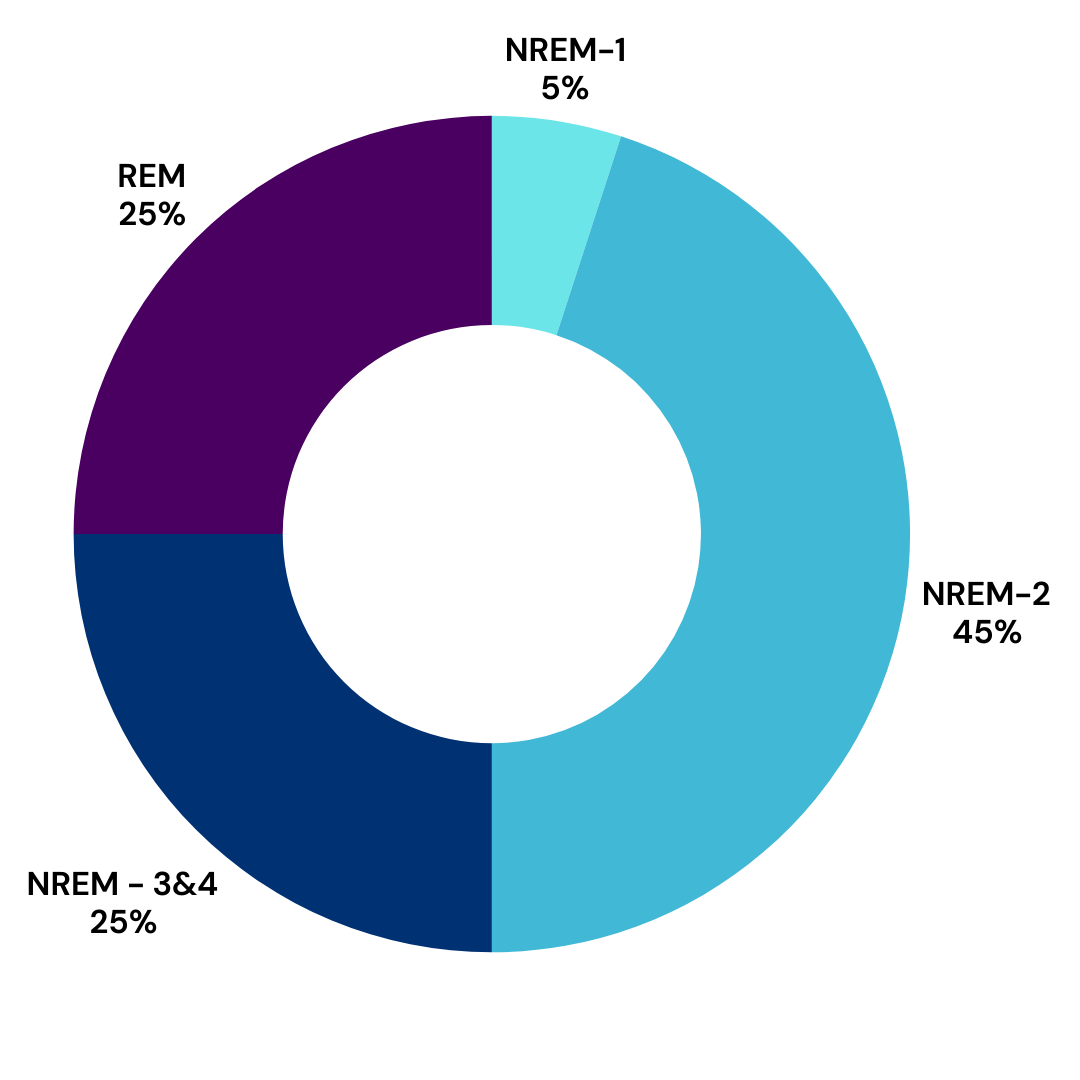Are you tired of waking up feeling like a zombie, dragging yourself through the day with a coffee IV drip? Let this be your ultimate guide to mastering your sleep cycle.
What Are Sleep Cycles Anyway?
Sleep is like a Netflix series with multiple seasons—each episode (or cycle) has its own plot twists. A typical sleep cycle lasts about 90 to 110 minutes. Here’s the breakdown:
Non-REM Sleep: This is where it all begins. It has four stages: Stage 1: The “I’m not really asleep” phase. You drift in and out, and if someone pokes you, you might mumble something hilariously random. Stage 2: Your heart rate slows, and your body temperature drops. It’s like your body is saying, “Okay, let’s get serious about this thing.” Stages 3 & 4: Deep sleep, where your body does all the heavy lifting—repairing tissues, building bone, and boosting your immunity. Basically, it’s your body’s version of a spa day. REM Sleep: This is where the dreams happen! Your eyes dart around like you’re watching an intense action movie, and your brain is buzzing with activity. Fun fact: This stage is crucial for learning and memory. So, if you’re cramming for exams or preparing for a big meeting, don’t skip out on REM! Some might be thinking, “I can totally function on three hours of sleep!” Sure, if you want to feel like a walking hangover.
Mental Health: One in four individuals with irregular sleep patterns is at an increased risk of developing anxiety and depression. Physical Health: Inadequate sleep is associated with numerous health hazards, such as obesity, type 2 diabetes, cardiovascular issues, and mental health conditions. Getting fewer than 6 hours of sleep may heighten insulin resistance, interfere with hormones that regulate appetite, elevate blood pressure, and impair the immune system, leading to a greater vulnerability to infections. Cognitive Function: Sleep deprivation can lead to a 50% decline in cognitive performance, particularly affecting attention and memory.
Longevity: Sleeping less than 6 hours a night is linked to a 15% higher risk of premature death. Emotional Resilience: Sleep-deprived individuals are 70% more likely to struggle with stress management.
Understanding Sleep Disorders Insomnia: Difficulty falling or staying asleep, leading to fatigue and irritability.
Sleep Apnea: Breathing interruptions during sleep, often accompanied by loud snoring and gasping. Restless Leg Syndrome: Uncomfortable sensations in the legs, causing an irresistible urge to move them, especially at night. Narcolepsy: Sudden sleep attacks during the day, often accompanied by cataplexy (loss of muscle control). Parasomnias: Abnormal behaviors during sleep, such as sleepwalking or night terrors.
If you're experiencing any of these, it’s a good idea to rethink your sleep hygiene and consider seeking professional help. The Role of Naps
Power Naps : Short naps (10-20 minutes) can provide a quick energy boost without interfering with nighttime sleep.
Longer Naps : Naps of about 90 minutes can allow for a full sleep cycle but may lead to grogginess if taken too late in the day. Foods That Promote Sleep:
Almonds: Rich in magnesium, which can help improve sleep quality and regulate melatonin levels.
Turkey: Contains tryptophan, an amino acid that can increase the production of melatonin and serotonin, promoting sleepiness. Kiwi: High in antioxidants and serotonin, studies suggest that eating kiwi may improve sleep onset, duration, and efficiency. Fatty Fish: Fish, like salmon and mackerel are rich in omega-3 fatty acids and vitamin D, both of which may enhance sleep quality. Oatmeal: A source of melatonin and complex carbohydrates, oatmeal can help increase the availability of tryptophan in the brain. Cherries: Particularly tart cherries, which are a natural source of melatonin, can help regulate sleep cycles. Bananas: High in potassium and magnesium, bananas can help relax muscles and promote sleep. Warm Milk: Contains tryptophan and has a soothing effect, which can help signal the body that it’s time to sleep. Leafy Greens: Spinach and other leafy greens are high in calcium, which helps the brain use tryptophan to manufacture melatonin. Whole Grains: Foods like brown rice and whole grain bread can help increase insulin levels slightly, allowing more tryptophan to enter the brain. The Impact of Lifestyle Choices
Exercise: Regular physical activity can improve sleep quality, but timing matters—avoid vigorous exercise close to bedtime.
Stress Management: Techniques like mindfulness, yoga, or journaling can help reduce stress and promote better sleep. Light and Noise Control: Minimize light and noise in the bedroom with blackout curtains, white noise machines, or earplugs. Temperature Regulation: Aim for a sleep-friendly temperature (around 60-67°F or 15-19°C) to enhance comfort. Hydration: Stay hydrated, but avoid drinking too much water right before bed to minimize nighttime bathroom trips. Sleep Tracking Apps: Consider using technology to monitor sleep patterns and improve sleep hygiene, but don’t become overly reliant on devices. Blue Light Filters: The blue light from screens can disrupt sleep. Use blue light filters or glasses in the evening to mitigate this effect. Sleep Myths Debunked
Here are some prevalent sleep myths clarified by research:
Are you tired of waking up feeling like a zombie, dragging yourself through the day with a coffee IV drip? Let this be your ultimate guide to mastering your sleep cycle.
What Are Sleep Cycles Anyway?
Sleep is like a Netflix series with multiple seasons—each episode (or cycle) has its own plot twists. A typical sleep cycle lasts about 90 to 110 minutes. Here’s the breakdown:
Some might be thinking, “I can totally function on three hours of sleep!” Sure, if you want to feel like a walking hangover.
Cognitive Function: Sleep deprivation can lead to a 50% decline in cognitive performance, particularly affecting attention and memory.
Insomnia: Difficulty falling or staying asleep, leading to fatigue and irritability.
The Role of Naps
Power Naps : Short naps (10-20 minutes) can provide a quick energy boost without interfering with nighttime sleep.
Foods That Promote Sleep:
Almonds: Rich in magnesium, which can help improve sleep quality and regulate melatonin levels.
The Impact of Lifestyle Choices
Exercise: Regular physical activity can improve sleep quality, but timing matters—avoid vigorous exercise close to bedtime.
Sleep Myths Debunked
Here are some prevalent sleep myths clarified by research:
Myth: Surviving on 5 hours of sleep is sufficient.
Fact: The majority of adults require 7-9 hours for optimal health.
Myth: Napping can make up for a lack of nighttime sleep.
Fact: Naps are beneficial but cannot replace the need for complete restorative sleep.
Myth: Snoring is not a cause for concern.
Fact: Loud and frequent snoring may signal obstructive sleep apnea, which is a serious condition.
Myth: Alcohol promotes better sleep.
Fact: Alcohol interferes with sleep cycles and diminishes sleep quality.
Myth: All individuals require the same quantity of sleep.
Fact: Sleep requirements differ from person to person; most adults need 7-9 hours.
Myth: You can make up for lost sleep on the weekends.
Fact: Sleeping in can help, but it does not fully offset the effects of chronic sleep deprivation.
Myth: It’s okay to sleep with the lights on.
Fact: Being exposed to light while sleeping can disturb circadian rhythms and affect sleep quality.
Myth: You can condition your body to need less sleep.
Fact: Ongoing sleep deprivation leads to negative health effects and does not allow for adaptation.
Recognizing these myths can aid in enhancing sleep practices and overall sleep quality.
Tips for Better Sleep (Because You Deserve It)
Set a Sleep Schedule: Try to go to bed and wake up at the same time every day. Your body loves routine, just like your favorite TV show. Consistency helps regulate your internal clock. Recognizing these myths can aid in enhancing sleep practices and overall sleep quality.
Tips for Better Sleep (Because You Deserve It)
Limit Screen Time: Put down the phone at least an hour before bed. Trust us, those late-night videos can wait until morning. Instead, consider reading a book or listening to calming music.
Create a Sleep Sanctuary: Make your bedroom a cozy haven. Dim the lights, keep it cool, and invest in some comfy bedding. Your bed should feel like a cloud, not a wrestling ring.
Watch What You Eat and Drink: Avoid heavy meals, caffeine, and alcohol close to bedtime. Your body needs to focus on sleep, not digesting that late-night pizza.
Experiment and Adapt: Everyone’s sleep needs are different. Experiment with various strategies to find what works best for you. Keep a sleep journal to track your habits and how they affect your rest.
Seek Professional Help if Needed: If you consistently struggle with sleep despite making changes, don’t hesitate to consult a healthcare professional. They can help identify any underlying issues and provide tailored advice.
Seek Professional Help if Needed: If you consistently struggle with sleep despite making changes, don’t hesitate to consult a healthcare professional. They can help identify any underlying issues and provide tailored advice.
So there you have it! Sleep cycles are more than just a snooze-fest; they’re a vital part of your health and well-being. By understanding how sleep works and making a few simple changes, you can unlock the secret to better rest. Remember, sleep isn’t just a luxury—it’s a necessity. So, hit that pillow with confidence, and let the sleep cycle saga begin! Sweet dreams!💤✨
So there you have it! Sleep cycles are more than just a snooze-fest; they’re a vital part of your health and well-being. By understanding how sleep works and making a few simple changes, you can unlock the secret to better rest. Remember, sleep isn’t just a luxury—it’s a necessity. So, hit that pillow with confidence, and let the sleep cycle saga begin! Sweet dreams!💤✨





.jpeg)





0 Comments